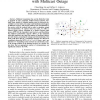Free Online Productivity Tools
i2Speak
i2Symbol
i2OCR
iTex2Img
iWeb2Print
iWeb2Shot
i2Type
iPdf2Split
iPdf2Merge
i2Bopomofo
i2Arabic
i2Style
i2Image
i2PDF
iLatex2Rtf
Sci2ools
103
click to vote
CORR
2010
Springer
2010
Springer
Multicast Capacity Scaling of Wireless Networks with Multicast Outage
Multicast transmission has several distinctive traits as opposed to more commonly studied unicast networks. Specially, these include (i) identical packets must be delivered successfully to several nodes, (ii) outage could simultaneously happen at different receivers, and (iii) the multicast rate is dominated by the receiver with the weakest link in order to minimize outage and retransmission. To capture these key traits, we utilize a Poisson cluster process consisting of a distinct Poisson point process (PPP) for the transmitters and receivers, and then define the multicast transmission capacity (MTC) as the maximum achievable multicast rate times the number of multicast clusters per unit volume, accounting for outages and retransmissions. Our main result shows that if transmission attempts are allowed in a multicast cluster, the MTC is (kx log(k)) where and x are functions of depending on the network size and density, and k is the average number of the intended receivers in a clus...
Related Content
| Added | 25 Dec 2010 |
| Updated | 25 Dec 2010 |
| Type | Journal |
| Year | 2010 |
| Where | CORR |
| Authors | Chun-Hung Liu, Jeffrey G. Andrews |
Comments (0)

